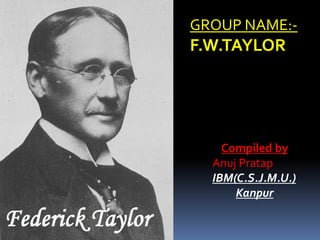
Management thought
- 1. GROUP NAME:- F.W.TAYLOR Compiled by Anuj Pratap IBM(C.S.J.M.U.) Kanpur
- 2. Frederick Winslow Taylor (March 20, 1856 – March 21, 1915) was an American mechanical engineer who sought to improve industrial efficiency. He is regarded as the father of scientific management and was one of the first management consultants.Taylor was one of the intellectual leaders of the Efficiency Movement and his ideas, broadly conceived, were highly influential in the Progressive Era.
- 4. Why study Management Theory?
- 5. What is management theory? Why is management theory important? Why is management theories important?
- 6. Evaluation of Management Thought
- 7. CLASSICAL APPROACH Classical theorists formulated principles for setting up and managing organizations. These views are labeled “classical” because they form the foundation for the field of management thought.
- 8. THE THREE MAJOR CONTRIBUTORS OF THE CLASSICAL APPROACH Administrative Bureaucratic Scientific Approach-: Approach- Management -: F. W. Taylor Henry Fayol :Max weber
- 9. SCIENTIFIC MANAGEMENT / CONTRIBUTION OF TAYLOR The concept of scientific management was introduced by Fredrick Winslow Taylor in USA in the beginning of 20th century. According to Taylor, “ Scientific management is concerned with knowing exactly what you want men to do and then see in that they do it in the best and cheapest way.”
- 10. :-Develop a science for each element of an individual’s work. :-Scientifically select and then training teaching development of the works. :-Heartily cooperate with the workers so as to ensure that all work is done in accordance with the principal of the science has been developed. :-Divide work and responsibility almost equally between management and which it is better salted than the workers.
- 11. ADMINISTRATIVE APPROACH/CONTRIBUTION OF HENRY FAYOL Henry Fayol, a French industrialist, has been regarded as the real father of modern management. He reduced his ideas based on practical experiences in his book, ‘Administration industrialle at Generali, published in 1916 in French language.
- 12. Fayol divided the activities of an industry into 6 groups- :-Technical :-Commercial :-Financial :-Security :-Accounting :-Managerial These activities are common all organization, whether big or small.
- 13. Fayol’s principle of Management 1. Division of work 2. Authority and responsibility 3. Discipline 4. Unity of command 5. Unity of direction 6. Subordination of individual interest to general interest 7. Remuneration of personnel 8. Centralization 9. Scalar chain 10. Order 11. Equity 12. Stability of tenure 13. Initiative 14. Esprit de corps
- 14. Discussion Question Which of the following is the most important aspect of Fayol’s principles of management? A. Division of Labor B. Unity of Command C. Remuneration of Personnel D. Esprit de corps
- 15. Bureaucracy
- 16. Characteristics of bureaucracy -:Division of work -:Hierarchy of Position -:Rules and Regulations -:Impersonal Relationship -:Official records
- 17. MAX WABER The great German sociologist and political economist was born on 21 April 1864. He worked in the field of economics sociology, history, law, politics and philosophy at the university of Berlin, Vienna and university of Munich. On 14 jun 1920 he left the word due to pneumonia.
- 18. Bureaucracy / Contribution of Max Weber Max weber’s main contribution to management is his theory of authority structure and his description of organi- zations based on the nature of autority relations within them.
- 19. There are three type of legitimate authority which run as follows- 1. Rational-Legal authority 2. Traditional authority 3. Charismatic authority
- 20. Neo classical Approach It is also called BEHAVIORAL APPROACH. The behavioral approach to management began with the ‘Howthorne experiment’.
- 21. a) Classical approach did not achieve total efficiency and workplace harmony. b) Managers still encountered problem because workers didn’t always behave as they were supposed to. Two branches: 1) Human Relations Approach 2) Behavioral Sciences Approach
- 22. Human Relations Approach -:Focus on the social environment of a job -:Refers to the manner in which managers interact with subordinates -:Managers must know why subordinates behave as they do -:Importance of individuals in success or failure of an organization -:Management should recognize employees’ need for recognition and social acceptance -:Management should look on work group as a positive force.
- 24. Four phases Illumination experiment Relay room experiment Bank wiring observation Interview program
- 25. Employees are Employees’ performance motivated by social is more a result of peer needs and association pressure than with others management’s incentives and rules Employees want to Managers need to participate in decisions involve subordinates that affect them in coordinating their work to improve efficiency
- 27. Snapshot “Teamwork is one of the most beautiful experiences in life. Teamwork is our core value and a primary way that the Container Store enriches the quality of employees’ work life.” Kip Tindell, President, The Container Store
- 29. TYPES OF MODERN SCHOOL 1.SYSTEMS APPROACH 2.CONTINGENCY APPROACH
- 30. SYSTEMS APPROACH External environment Input (Resources) Output Transformation Human Product Capital Services Materials
- 31. CONCEPT Sub System Synergy Open & close System System Boundary Flow Feed Back
- 32. CONTINGENCY APPROACH Approaches depend on the variables of the situations Draws on all past theories in attempting to analyze and solve problems Is integrative Summarized as an “it all depends” device Tells managers to look to their experiences and the past and to consider many options before choosing Encourages managers to stay flexible